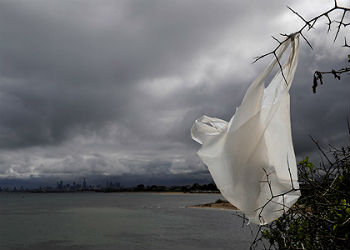 The law that banned plastic bags in retails stores on the Outer Banks was passed five years ago this week. Photo: Craig Abraham, The Age |
NAGS HEAD — When it was passed by legislators five years ago this week, the ban on plastic bags on the Outer Banks was one of the few in the country.
Since then more than 125 communities have followed suit in banishing one of the most ubiquitous sources of litter on their streets and beaches.
Supporter Spotlight
“It makes things a whole lot easier to keep clean,” said Clyde Gard, Dare County’s assistant public works director. “The wind picks those things up, and when it picks it up, it goes on and on and on.”
The ban covers only retail stores on Ocracoke, Hatteras and Bodie islands, and Corolla and Carova in Currituck County. There, merchants are required to use recyclable brown paper bags instead of plastic. Customers who bring their own reusable bags are credited 5 cents per bag.
Gard said that plastic bags are still a big part of the waste stream, since out-of-town visitors bring them, and retailers in nearby Manteo are not included in the ban. It’s hard to pinpoint why the bags still litter the sides of the road on Hatteras, he said, but it’s likely that at least some of the lightweight bags blow off the trash trucks.
“We pick them up all day long,” Gard said, adding he never hears anyone complain anymore about the ban. “As far as me personally, I wish they were all gone.”
Former state senator, Marc Basnight, a Manteo Democrat and Outer Banks native, promoted the bag ban bill primarily as a way to keep the barrier islands’ beaches and waterways cleaner. He was also worried that the thin bags, made of carbon-based polyethylene, were known to harm marine life, especially sea turtles.
Supporter Spotlight
“Unfortunately for many sea turtles and other marine wildlife, they see balloons, plastic bags and other debris as food and ingest them, causing digestive blockage, which can lead to death,” Karen Fitzgerald, president of the Network for Endangered Sea Turtles, said in an e-mail.
However, Fitzgerald said it would be difficult to determine definitively if there has been a decline in turtle interactions with the bags.
“Circumstantially our volunteers have noticed fewer bags on the beach during their regular patrols,” she added. “If anything, the plastic bag ban has certainly made a better beach-going experience by reducing their presence!”
 Marc Basnight |
The ban was expanded to 2010 to include all retail outlets on the Outer Banks, rather than just the larger ones. According to Basnight’s staff in 2009, the senator knew that the legislature would never pass a statewide ban and he had no intention to try.
In March 2011, lawmakers in the newly-elected Republican majority General Assembly introduced legislation that would have repealed the ban. The N.C. Retail Merchants Association and the American Chemistry Council also opposed the bag ban on the Outer Banks
But the repeal never gained traction, and the Outer Banks is still the only place in the state with the ban, said Ellen Lorscheider, environmental program supervisor with the state Division of Waste Management.
As part of the bag ban legislation, Lorscheider said, a survey of about 100 merchants was conducted at the end of 2011. “The retailers were very positive about this law,” she said. “One of the questions we asked was if they thought it made a difference and the response was very positive that it did.”
In the early months of the ban, there were a few complaints about some stores not participating, Lorscheider said, but mostly it was due to confusion about Manteo not being part of the law. Now her office doesn’t hear anything at all about the law – good or bad – from the public.
Whatever consternation that retailers and consumers on the Outer Banks experienced about the ban seems to have been alleviated, said Willo Kelly, who back then was the chairwoman of BlueGreen Outer Banks, a now-dormant non-profit that promoted sustainability.
“I think it has settled down,” Kelly said. “Everybody has kind of accepted the fact that people have to use paper bags.”
Initially, business owners were worried about the increased cost — up to three times that of plastic — and storage needs of paper, she said. Numerous meetings and conference calls were held to discuss the concerns.
“We thought it was going to be such a big issue in the beginning,” she recalled. “But you know, it all worked out and people found a way to deal with it.”
 Willo Kelly of the Outer Banks said she is disappointed that more people don’t bring re-usable tote bags when they go shopping. Photo: iSustainableEarth |
Some businesses saw the marketing opportunity and made re-usable totes with their business logo on them. Although many residents have collected a vast supply of cloth bags, Kelly said she is disappointed that more people don’t bring re-usable bags when they go shopping.
Angela Conner Tawes, a manager at Conner’s Supermarket in Buxton, said that customers have gotten used to the paper bags, although some would still like to use plastic bags to pick up after their dogs or have to carry groceries in the rain or up stairs.
“I’m still not happy about it because of the cost and the space,” she said, “and because I think the consumer is smart enough to make the choice.”
Conner’s, a family-owned small grocer, serves loyal local residents all year long, plus thousands of visitors in the summer months. Overall, the response about the ban runs about 50-50, said Rebecca Salyers, another manager at the store.
Salyers said she doesn’t know if there is less litter on the island, but she does know that she would “absolutely” favor a repeal of the ban.
“Our issue is mainly the expense,” she said, adding that the paper bags also take up a lot more storage space. “It’s not very fair to the vendors.”
When the plastic bag ban was passed in North Carolina in June 2009, only five cities in California also had bans, with San Francisco being first in 2007.
According to an April 22, 2014, article on the Earth Policy Institute’s web site, there are now 132 cities and counties across the United States that have plastic bag bans in place (although the data do not include the Outer Banks of North Carolina). There are also many nations overseas that have banned the bags.
The single-use plastic bag was invented in Sweden in 1962 and introduced in the U.S. about 10 years later by Mobil Oil as a way to increase the market for polyethylene, a petroleum by-product, the article said.
Consumers use about 100 billion plastic bags a year in the U.S., often for just minutes, it said, yet the amount of energy used to make 12 bags could power a car for a mile. The bags last for hundreds of years in the landfill, and the ones that blow away create blight in the environment and are often mistaken for food by wild animals.
Gard, the public works director, said he would favor a complete ban of plastic bags, certainly on all of Roanoke Island and mainland Dare County.
“That would be a move in the right direction,” he said. “The paper is not near as bad. We haul a lot of paper bags, and they get recycled.”







